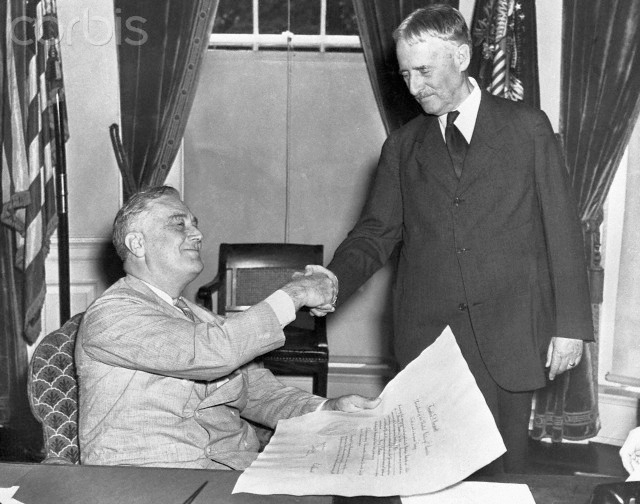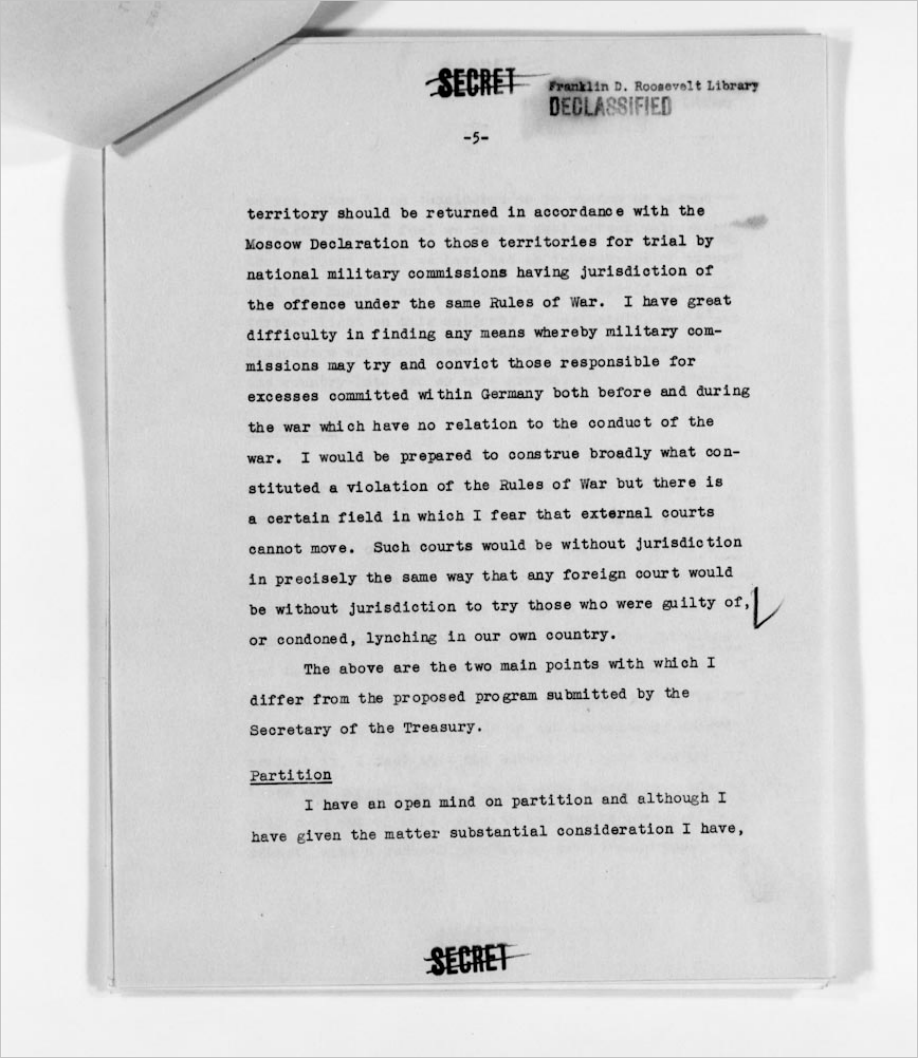[Note: As this is taken from an
archived site, some links and videos below may not be working.]
Could the Nazis have tried U.S. citizens for lynchings?
President Franklin Roosevelt and Secretary of War Henry L. Simpson
Below is a lengthy
extract from a Simpson memo to Roosevelt regarding the infamous
Morgenthau Plan, in which he makes an interesting analogy regarding the
proposed plans to try Germans for crimes against other Germans:
WAR DEPARTMENT
WASHINGTON
Memorandum for the President
September 9,
1944
Our discussions
relate to a matter of method entirely; our objective is the
same. It is not a question of a soft treatment of Germany or a
harsh treatment of Germany. We are all trying to devise
protection against recurrence by Germany of her attempts to
dominate the world. We differ as to method. The fundamental
remedy of Mr. Morgenthau is to provide that the industry of
Germany shall be substantially obliterated. Although expressed
only in terms of the Ruhr, the fact of the matter is the is the
Ruhr and the adjacent territories which Mr. Morgenthau would
include in his program constitute, particularly after the
amputations that are proposed, the core of German industry. His
proposition is
"the total destruction of the whole German armament industry and
the removal or destruction of other key industries which are
basic to military strength."
In speaking of the Ruhr and surrounding industrial areas, he says:
"This area should not only be stripped of all presently existing
industries but so weakened and controlled that it cannot in the
foreseeable future become an industrial area—all industrial
plants and equipment not destroyed by military action shall
either be completely dismantled or removed from the area or
completely destroyed, all equipment shall be removed from the
mines and the mines shall be thoroughly wrecked."
I am unalterably opposed to such a program for the reasons given
in my memorandum dated September 5 which is already before the
President. I do not think that the reasons there stated need
again be elaborated. In substance, my point is that these
resources constitute a natural and necessary asset for the
productivity of Europe. In a period when the world is suffering
from destruction and from want of production, the concept of the
total obliteration of these values is to my mind wholly wrong.
My insistence is that these assets be conserved and made
available for the benefit of the whole of Europe, including
particularly Great Britain. The in internationalization of the
Ruhr or the trusteeship of its products—I am not prepared at the
moment to discuss details of method—constitutes a treatment of
the problem in accord with the needs and interests of the world.
To argue that we are incapable of sustained effort to control
such wealth within proper channels is to destroy any hope for
the future of the world. I believe that the education furnished
us by the Germans in two world wars, plus the continuity of
interest which such a trusteeship would stimulate is sufficient
insurance that we can be trusted to deal with the problem. The
unnatural destruction of this industry would, on the other hand,
be so certain, in my judgment, to provoke sympathy for the
Germans that we would create friends both in this country and
abroad for the Germans, whereas now most of the peoples of the
world are thoroughly antipathetic to them.
The other
fundamental point upon which I feel we differ is the matter of
the trial and punishment of those Germans who are responsible
for crimes and depredations. Under the plan proposed by Mr.
Morgenthau, the so-called arch-criminals shall be put to death
by the military without provision for any trial and upon mere
identification after apprehension. The method of dealing with
these and other criminals requires careful thought and a
well-defined procedure. Such procedure must embody, in my
judgment, at least the rudimentary aspects of the Bill of
Rights, namely, notification to the accused of the charge, the
right to be heard and, within reasonable limits, to call
witnesses in his defense. I do not mean to favor the institution
of state trials or to introduce any cumbersome machinery but the
very punishment of these men in a dignified manner consistent
with the advance of civilization, will have all the greater
effect upon posterity. Furthermore, it will afford the most
effective way of making a record of the Allies to terminate the
system and prevent its recurrence.
I am disposed to
believe that at least as to the chief Nazi officials, we should
participate in an international tribunal constituted to try
them. They should be charged with offences against the laws of
the rules of ear in that they have committed wanton and
unnecessary cruelties in connection with the prosecution of the
war. This law of the Rules of War has been upheld by our own
Supreme Court and will be the basis of judicial action against
the Nazis.
Even though
these offences have not been committed against our troops, I
feel the that our moral position is better if we take our share
in their conviction. Other war criminals who have committed
crimes in subjugated territory should be returned in accordance
with the Moscow Declaration to those territories for trial by
national military commissions having jurisdiction of the offence
under the same Rules of War. I have great
difficulty in finding any means whereby military commissions may
try and convict those responsible for excesses committed within
Germany both before and during the war which have no relation to
the conduct of the war. I would be prepared to construe broadly
what constituted a violation of the Rules of War but there is a
certain field in which I fear that external courts cannot move.
Such courts would be without jurisdiction in precisely the same
way that any foreign court would be without jurisdiction to try
those who were guilty of, or condoned, lynching in our own
country.
The above are
the two main points with which I differ from the proposed
program submitted by the Secretary of the Treasury.
The instigators of the
Nuremberg trial found their means to try Germans for crimes against
Germans with Article 6C in the London
Charter. And with its "common plan and conspiracy" clause, in one
fell swoop they had ensnared everyone in anyway connected with the
regime of the Third Reich as part of the alleged conspiracies of
"murder, extermination, enslavement, deportation, and other inhumane
acts committed against any civilian population, before or during the
war, or persecutions on political, racial or religious grounds ..."
Jewish-American lawyer Prof. Bernard D. Meltzer, who was himself a
prosecutor during the subsequent Nuremberg Military tribunals, wrote many
years later:
"Article 6 C of
the Charter drafted in the London Agreement was in a way
formulated exclusively with the thought of prosecuting the Nazi
leaders held responsible for the atrocities committed against
the Jewish people and other targeted groups both inside and
outside Germany."
------------------------------
"When a Jew, in America or in South Africa, talks to
his Jewish companions about 'our' government, he means the
government of Israel."
- David Ben-Gurion, Israeli Prime Minister

Viva Palestina!
Latest Additions
- in English
What is this Jewish
carnage
really about? - The background to
atrocities
Videos on Farrakhan, the Nation of Islam and Blacks and Jews

How Jewish Films and Television Promotes bias Against
Muslims
Judaism is Nobody's
Friend
Judaism is the Jews' strategy to
dominate non-Jews.
Jewish War Against
Lebanon!
Islam and Revolution
By Ahmed Rami
Hasbara -
The Jewish manual
for media deceptions
Celebrities bowing to their Jewish masters

Elie Wiesel - A Prominent False Witness
By Robert Faurisson
The Gaza atrocity 2008-2009

Iraq - war and occupation
Jewish War On
Syria!
CNN's Jewish version of "diversity"
- Lists the main Jewish agents
Hezbollah the Beautiful
Americans, where is your own Hezbollah?
Black Muslim leader Louis Farrakhan's Epic Speech in Madison Square
Garden, New York
 - A must see!
- A must see!
"War on Terror" -
on Israel's behalf!
World Jewish Congress: Billionaires, Oligarchs, Global Influencers for Israel
Interview with anti-Zionist veteran Ahmed Rami of Radio Islam
- On ISIS, "Neo-Nazis", Syria, Judaism, Islam, Russia...
Britain under Jewish
occupation!

Jewish World Power
West Europe
East Europe
Americas
Asia
Middle East
Africa
U.N.
E.U.
The Internet and
Israeli-Jewish infiltration/manipulations
Books
- Important collection of titles
The Judaization of
China
Israel: Jewish Supremacy in Action
- By David Duke
The Power of Jews in France
Jew Goldstone appointed by UN to investigate War Crimes in Gaza

The best book on Jewish Power
The Israel Lobby
- From the book
Jews and Crime - The archive
Sayanim - Israel's and Mossad's Jewish helpers abroad
Listen to Louis Farrakhan's Speech
- A must hear!
The Israeli Nuclear Threat
The "Six
Million" Myth
"Jewish History"
- a bookreview
Putin and the
Jews of Russia
Israel's attack on US warship USS Liberty
- Massacre in the Mediterranean
Jewish "Religion" - What is
it?
Medias
in the hands of racists
Strauss-Kahn - IMF chief and member of Israel lobby group

Stop Jewish Apartheid!
The Jews behind Islamophobia
Israel controls U.S. Presidents
Biden, Trump, Obama, Bush, Clinton...
The Victories of Revisionism
By Professor Robert Faurisson
The Jewish hand behind Internet
The Jews behind Google, Facebook, Wikipedia,
Yahoo!, MySpace, eBay...
"Jews, who want to be decent human beings, have to renounce being Jewish"
Jewish War Against Iran
Jewish Manipulation of World Leaders

Al Jazeera English under
Jewish infiltration

Garaudy's "The Founding
Myths
of Israeli Politics"
Jewish hate against Christians
By Prof. Israel Shahak
Introduction to Revisionist
Thought
- By Ernst Zündel
Karl Marx: The Jewish Question
Reel Bad Arabs
- Revealing the racist Jewish Hollywood propaganda
"Anti-Semitism" - What is it?
Videos
 - Important collection
- Important collection
The Jews Banished 47 Times in 1000 Years - Why?
Zionist
strategies
- Plotting invasions, formenting civil wars, interreligious strife,
stoking racial hatreds and race war
The International Jew
By Henry Ford
Pravda interviews Ahmed Rami

Shahak's
"Jewish History,
Jewish Religion"
The Jewish plan to destroy the Arab countries
- From the World Zionist Organization
Judaism and Zionism inseparable
Revealing photos of the Jews 
Horrors of ISIS Created by Zionist Supremacy
- By David Duke
Racist Jewish Fundamentalism
The Freedom Fighters:
 Hezbollah
- Lebanon
Hezbollah
- Lebanon
 Nation of Islam
- U.S.A.
Nation of Islam
- U.S.A.
Jewish Influence in America

- Government, Media, Finance...
"Jews" from
Khazaria stealing the land of Palestine
The U.S. cost of supporting Israel
Turkey, Ataturk and
the Jews

The truth about the Talmud
Israel and the Ongoing Holocaust in Congo
Jews DO control the media -
a Jew brags!
- Revealing Jewish article
Abbas - The Traitor
Protocols of Zion
- The whole book!

Encyclopedia of the
Palestine Problem
The
"Holocaust" - 120 Questions and Answers
Quotes
- On Jewish Power / Zionism
Caricatures / Cartoons

Activism!
- Join the Fight!




































